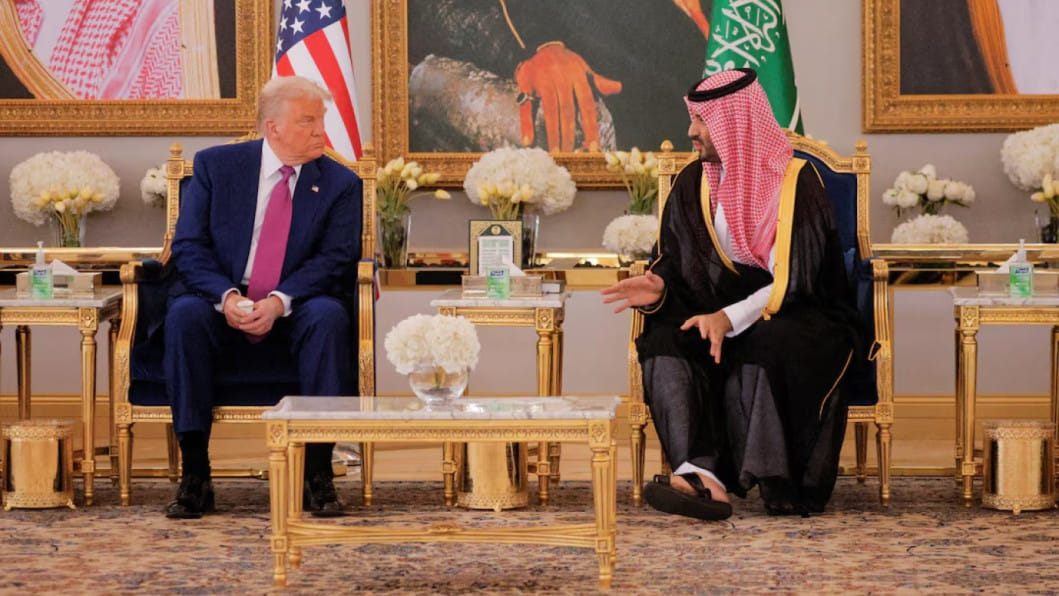Trump’s Saudi visit: Can it be ‘game over’ for Netanyahu?

Things change quickly. In November, when Trump won the election, Netanyahu's eyes beamed. He hailed Trump's re-election as the "greatest comeback in history," and was the first foreign leader to visit the White House. The Trump administration's rhetoric, public crackdown on pro-Palestine protests in the US, along with the appointment of staunch pro-Israeli members in his Republican administration, made it seem like the friendship between the two leaders would be emboldened over the next four years. But Trump defines the nature of US interests abroad not through a friendship context, but rather a transactional trade frame. Ukrainian President Zelensky learned the hard way that Trump likes to "hold the cards." Netanyahu, as shrewd as he portrays himself to be, seems poised to learn the same.
On Tuesday, Donald Trump arrived in Riyadh, embarking on his first foreign trip as US president to the Gulf nations. During Trump's first term, he recognised Jerusalem as the capital of Israel, unlike any other US president before. The president visited with the aim of normalising Israel's relationships with the powerful Gulf nations by sidelining the heart of the issues in the Middle East: the Palestinian cause—a win for Netanyahu. But for the Israeli government, this trip has an unprecedented atmosphere of panic surrounding it, with high stakes that could work against Netanyahu. On Monday, May 12, the Israeli scene witnessed remarkable media momentum that reflected escalating field tensions, internal political confusion, and clear disarray in the management of prisoners' files and negotiations with Hamas. Developments in the upcoming release of American-Israeli soldier Edan Alexander, as part of an uncoordinated US initiative with Tel Aviv, have dominated Hebrew media headlines, amid warnings of serious strategic repercussions for Israel's regional and international status.
Due to the strong bond between Israel and the US, we, Palestinians, could not easily believe that there might be any real dispute between Trump and Netanyahu. But it's important to realise that a dispute between Donald Trump and Netanyahu does not mean a dispute between the US and Israel.
The relationship between Netanyahu and Trump, the two leaders, was a tactical one, but the relationship between the nations is a strategic one. We are also unaware to what extent the relationship has been affected, so we must understand one integral fact: the US can abandon Netanyahu, but they will never abandon Israel. The latter was deliberately created to serve the West's interests in the Middle East. It is true that Trump has shown patterns of causing disruptions with allies for his own gains, but Israel is home to a key US defence base, and Israel provides strategic US foothold and intelligence and technology partnerships in the Middle East. Previous US Presidents such as Bill Clinton, Barack Obama, and Joe Biden did not share good relations with Netanyahu, but the US has steadfastly supported Zionism and undermined the Palestinian cause.
Before Trump was inaugurated, he imposed a deal on Hamas and Israel to stop the war, to agree to a ceasefire, which did happen. But immediately after they exchanged hostages, and Netanyahu was able to salvage some of his reputation within Israeli society, he turned his back on the deal. At first, we would have interpreted the continuation of the war to also be in Trump's interest, and that Netanyahu's betrayal was written on the walls given Trump and Netanyahu's cosy relationship. But today the situation is a bit different.
An adviser to Trump told The Washington Post, "In MAGA, we are not Bibi fans." Speaking on condition of anonymity, the adviser added, "Trump is adamant: He wants people to put the guns down." By contrast, Netanyahu has been adamant about war with Iran, which Trump has been vocal against. Last month, it was reported that Israel has not ruled out an attack on Iran's nuclear facilities, despite President Trump telling Netanyahu that the US would be unwilling to support such a move. It is possible that US intelligence has discovered information that Israel is planning to hit an Iranian nuclear power plant—which has led Trump to bypass Israel.
Three recent moves by Donald Trump indicate signs of tensions with Netanyahu. First, Trump's direct negotiation with Hamas, bypassing Israel, to release American hostage Edan Alexander was embarrassing for Netanyahu. On Sunday, senior Hamas leader Khalil Al-Hayya said they would release Alexander following direct talks with US officials. Netanyahu has long insisted that the war needs to continue to destroy Hamas, bring back the hostages, and secure peace in the Middle East—but now the US is showing a different pathway: they have the power to bring back the hostages; they can negotiate themselves.
Secondly, Trump has recently negotiated a ceasefire deal, mediated by Oman, with the Yemeni Houthis, to stop attacking US ships in the Red Sea and disrupting trade routes in exchange for which the US would also stop bombing Houthis. The US-Houthi deal did not include Israel, and attacks between Israel and the Houthis continued. The third move, and perhaps the most nerve-wracking one for Netanyahu, has been Trump's direct engagement with Iran. In the Oval Office in April, Trump announced, much to Netanyahu's surprise, that the US would hold direct talks with Iran over its nuclear programme. A Trump adviser also told The Washington Post that influential MAGA voices and neoconservative Republicans have spent all spring working to resist efforts by pro-Israeli lobbying groups, who are overly sympathetic to Netanyahu and have pushed to install Iran hawks in the government. Trump recently sacked Mike Waltz as National Security Adviser, after Waltz mistakenly added the editor-in-chief of The Atlantic magazine, Jeffrey Goldberg, to a Signal chat. Insiders told The Washington Post that Waltz upset Trump by adopting an increasingly hawkish stance regarding Iran and his "intense coordination" with the Netanyahu over the possibility of launching military strikes on Iran.
The two leaders are no longer on the same page. The mood music has also conspicuously shifted, with US special envoy to the Middle East, Steve Witkoff—unlike the Biden administration's Antony Blinken—criticising Israel for prolonging the war and delaying the hostage deal. Trump has also shown his tendency to revere questionable "absolute leaders" whose shields of power cannot be threatened, as evidenced by his meeting with Kim Jong-un of North Korea. Netanyahu is in a deadlock situation—becoming increasingly unpopular in his country for continuing the war. But Netanyahu also cannot hold a ceasefire or end the war—which costs Trump money. Netanyahu's juniors, Smotrich and Gvir, would collapse the coalition if the war ends, which shows Netanyahu's leadership weakness. Trump is not a fan of weakness.
Now, the other issue is that the leaders in the Middle East, after October 7, with the atrocities taking place, have no trust whatsoever in Netanyahu as a person and especially as a leader. Although many Middle Eastern countries do not outrightly oppose normalisation with Israel, they are unlikely to agree to a deal with Netanyahu, who the Arab states accuse of committing collective genocide. Trump has, therefore, repositioned the historic lens of viewing US relations in the Middle East via Israel by pursuing direct engagements.
But we must not forget that Donald Trump is primarily a businessman, and he wants to make America "great again." In other words, he wants to make America rich again. He is now meeting with the richest people in the Middle East, and three energy-rich Gulf Arab nations, and his main purpose is to gain some wins to burnish his image as a negotiator. Trump is seeking at least $1 trillion in investments from Saudi Arabia, including arms purchases which have not yet been agreed upon. But in January, it was announced that plans were in place to expand trade and investment with the US by $600 billion over the next four years, with potential for more.
The Gulf nations have similar interests in formalising their positions as indispensable partners for the US. They also want to extract as much benefit as they can. Last year, the US and Saudi Arabia came close to securing a mega-deal which included a package of agreements that would have encompassed security, economic, and technological guarantees to the kingdom, as well as US support for its civilian nuclear programme. The deal also included normalisation of Israeli-Saudi relations and a component for a pathway to a Palestinian state. The deal would have consolidated the US position in the Middle East and given the US an upper hand in its superpower rivalry with China. But the deal was stalled over Saudi insistence that Israel commit to a path towards Palestinian statehood.
Normalisation of Israeli relations with Saudi Arabia is in Donald Trump's interest right now, as it would open the road for other Muslim countries. For Saudi Arabia, securing an end to the genocide in Gaza and recognition of Palestinian statehood will be high on the list of what they want from Trump. The public in Saudi Arabia supports the Palestinian cause, and continuation of the genocide in Gaza has harmed public support for Saudi Arabia's Crown Prince Muhammad bin Salman (MBS). Saudi Arabia would strengthen its position as a leader in the Middle East if it can bring an end to the genocide and make the US formally recognise Palestinian statehood as part of their negotiations with Trump. If MBS succeeds in achieving this, he would emerge as a hero for the Muslim world.
For Palestinians, the hope is that Saudi Arabia will not accept any deal that promises Palestinian statehood and an end to the war until it is delivered. History has never shown any precedent to suggest that the US will support Palestinians' right to self-determination beyond words.
But in order to deliver conditions related to Palestinian sovereignty imposed by Saudi Arabia and the Gulf nations, Trump would have to break rank with Netanyahu and find an alternative Israeli leader who would obey the US. So, has the relationship between Trump and Netanyahu run its course? The results of the trip in the next few days will give us more signals. But make no mistake, Netanyahu's murderous career stands on thin ice, and it will crack, one day or another.
Yousef SY Ramadan is Palestinian Ambassador to Bangladesh.
Views expressed in this article are the author's own.
Follow The Daily Star Opinion on Facebook for the latest opinions, commentaries and analyses by experts and professionals. To contribute your article or letter to The Daily Star Opinion, see our guidelines for submission.


 For all latest news, follow The Daily Star's Google News channel.
For all latest news, follow The Daily Star's Google News channel. 





Comments